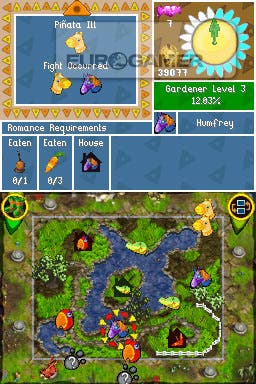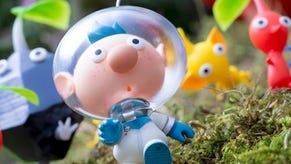Viva Pi?ata: Pocket Paradise
Breeding marvellous.
Elsewhere, the DS version sadly doesn't take advantage of the Nintendo Wi-Fi Connection to allow you to share access to your garden, so there's no scope for Animal Crossing-style guided tours, but you can at least trade animals with friends, providing you have their code. There's also a "Playground" mode for playing with your piñata free from the constraints and resource-management treadmill of the core "Garden" mode, although we didn't really enjoy this: the game generates garden terrain based on some pre-selected tiles and then you can summon animals at will, but we prefer the graft of the main mode's progression. Another addition we do like though is the "Episodes" - optional, purpose-built tutorials, which won't do much for people who pick it all up quickly, but clearly and interactively demonstrate principles that others might not grasp, like how to use shellybeans to get rid of weeds and how to separate warring piñata without one or other getting smashed to bits or sold off.
There are a few occasions when the concessions made to newcomers go a bit far, however; most notably with the rewards for Piñata Central requests. Piñata belong at parties being smashed up by kids, obviously, so occasionally Piñata Central asks for some of your best to send off to some unseen faraway family gathering, and when the animals respawn in your garden buoyed by the experience, they come with a bunch of romance sweets by way of thanks. Romance sweets aren't so much aphrodisiacs as intravenous nymphomania; as long as you have a house and a pair of the same animals, you can get them at it in seconds by throwing down a couple of them, and you quickly build up a healthy stock. More to the worrying point, this shortcuts the part of the game where you plant the relevant flowers, work out an item to tinker and generally manufacture prescribed circumstances to get animals to mate. Because unlike the 360 version, you can use romance sweets whether your animals have mated before or not.

This may sound good to people who haven't played Viva Piñata before, but bear in mind that manufacturing circumstances by gardening or playing zoo-keeper is what the entire game is about. If you can't enjoy raising a colony of sherbat-men and renaming them Bale, Clooney, Keaton and Kilmer, or spying a deer on the fringes of your land and madly carpeting the place in long grass to tempt it inside, or buying a chicken to hatch a couple of eggs faster and then to be served up to a suddenly-interested fox; then this isn't the game for you. Reducing the burden of experimentation and earthy graft with easy access to romance sweets rather goes against the spirit of the game.
Veterans of the 360 original may also remember that certain actions become rather repetitive as the game proceeds, and while the addition of an improved interface reduces this it's not a problem completely solved, with flower-tending still rather exhausting in a heavily populated garden, for instance. Similarly, even those with nearly two-year-old memories of Viva Piñata may struggle to summon the same levels of enthusiasm now that so many of the core species are known; at least part of the thrill the first time around is admiring new creatures, who arrive on the outskirts in greyscale, before smiling broadly as you meet their requirements and they cross the threshold into colour and residence, usually skipping or quacking as they go.
However, what Viva Piñata: Pocket Paradise loses in coming second, and not having a triple-core PowerPC chip to drive its graphics, it makes up with its new, much better stylus-based interface, and Rare's impressive feat of retaining the vast majority of the original game's best features, in roughly the same measures. It's still a bit too complex to work as a kids' game (for that you might be better with the 360 sequel's co-op mode, where you can pick up a second pad and offer a helping hand), but for everybody else it comes highly recommended.



